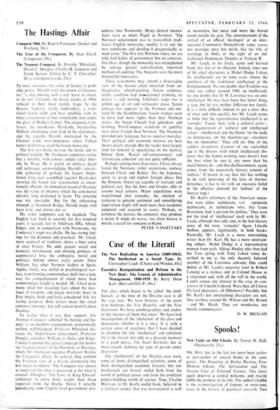Case of the Literati
The New Radicalism in America (1889-1963): The Intellectual as a Social Type. By Christopher Lasch. (Chatto and Windus, 45s.) Executive Reorganization and Reform in the New Deal : The Genesis of Administrative Management, 1900-1939. By Barry Dean Karl. (Harvard/O.U.P., 48s.)
THE class which began to be called 'the intel- lectuals' at the time of the Dreyfus case is all the rage now. We have histories of the great twin brethren, the New Republic and the New Statesman. We have autobiographies and studies of the 'masters of them that knew.' We have had investigations of the `alienation' of the class and discussions whether it is a class. It is with a certain sense of weariness that I have decided to abandon the title 'intellectual' and substitute for it the literati. not only as a pleasant memory of a good movie, The Small Bachelor, but as more exactly defining the type of person under discussion.
The 'intellectuals' of the Dreyfus case were, some of them, distinguished scientists; some of them distinguished academic lawyers; but our intellectuals are literati, exiled both from the world of political power and from the confident empire-building world of science. True, Charles Merriam, in Dr. Karl's useful book, believed in a 'political science' that was instrumental as well as normative, but more and more the literati stood outside the gate. The announcement of the arrival of an official 'ideologist' at an inter- national Communist Donnybrook today causes not nostalgic envy but mirth, like the role of astrology in India or the sight of an old- fashioned Dominican Thomist at Vatican H.
Mr. Lasch, in his lively, acute and learned book, has few or no illusions. Indeed, since one of his chief characters is Mabel Dodge Luhan, his intellectuals are in some cases almost the antithesis of the traditional intellectual of the Enlightenment. No one doubts that Franklin was what was called, around 1900, an intellectual; no one doubts that D. H. Lawrence was an anti- intellectual. He may have been that better thing, a sage, but he was neither Jefferson nor Jaures. It is a little difficult, indeed, to get a clear idea of what and who qualify, but Mr. Lasch seems to think that the representative intellectual is an `outsider.' Faced, then, with a cultural crisis— the degeneration of 'cultural and intellectual values'—intellectuals put the blame 'on the mob, on democracy, on the machine-age—anywhere but on themselves.' They still do. One of the saddest deceptions d'amour of our cuckolded age is the distress with which intellectuals dig* cover that the honest working man doesn't love the best when he sees it, any more than his social betters do—and that disillusionment, agdin, comes from the excessively literary content of 'culture.' (I hasten to say that this has nothing to do with ignorance of the laws of thermo- dynamics; it has to do with an excessive belief in the effective demand for 'culture' of the literary type.)
Dr. Karl's reformers of the American execu-
tive were either technicians, rail, optimistic technicians, or technicians who, like Louis Brownlow, had 'a passion for politics.' They were not the kind of 'intellectual' dealt with by Mr. Lasch, although that odd, and, in the bad literary sense of the term, 'romantic' figure Lincoln Steffens appears, legitimately, in both books. Naturally, Mr. Lasch is a more entertaining writer than Dr. Karl. He has a more entertain- ing subject. Mabel Dodge is a representative woman from early Aldous Huxley who then had her Taos spring with Tony Luhan (once de- scribed to me as the only decently behaved member of the Lawrence ashram). One could demur at Mr. Lasch's excessive trust in Robert Lansing as a witness and in Colonel House as a statesman and, with all the will in the world, I can't arouse any interest in the crise de con- science of Lincoln Colcord. Were they all Cherry Orchard characters, all Oblomovs? Possibly; but Dr. Karl's less entertaining characters are not; they are busy around Mr. Wilson and Mr. Brown —and Mr. Heath. They are mandarins, not merely commentators.
D. W. BROGAN


































 Previous page
Previous page